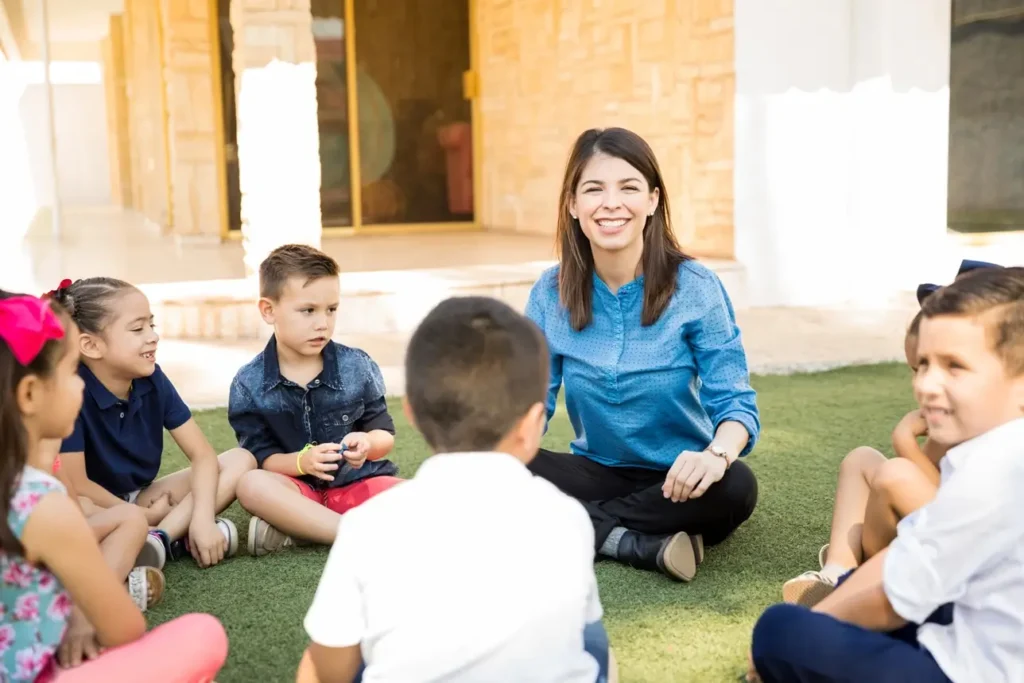Written By – Ms. Deepti Bedi, PYP IB Educator
Introduction:
Storytelling, an ancient art form, has transcended time and culture, weaving narratives that not only entertain but also profoundly impact the emotional and cognitive development of children. In children, storytelling provides many psychological and educational benefits, such as enhanced imagination to help visualize spoken words, improved vocabulary, and more refined communication skills. As we explore the multifaceted benefits of storytelling, we’ll emphasize its positive impact on emotional regulation, understanding, sharing, and overall well-being. Additionally, we’ll delve into how storytelling cultivates socially joyful individuals with profound and magnetic personalities, adept at observation and visualization.
Emotional Regulation Through Narratives:
In the intricate tapestry of storytelling, emotional regulation emerges as a vital thread. Children often grapple with a myriad of emotions, and storytelling provides a safe and constructive avenue for emotional expression and regulation. Characters and situations in stories serve as mirrors for children, enabling them to identify and understand various emotions. Whether it’s the triumph of a hero or the challenges faced by a protagonist, narratives teach children that emotions are natural and manageable. As they empathize with fictional characters, children develop a broader emotional vocabulary and the ability to regulate their own feelings.
Understanding the World:
The power of storytelling lies in its ability to serve as windows into different cultures, perspectives, and experiences. By exposing children to diverse narratives, we cultivate a sense of empathy and understanding. Through tales of courage, kindness, and resilience, children learn valuable life lessons that contribute to their moral and ethical development. The ability to understand the world through stories transcends geographical boundaries, fostering a sense of unity and interconnectedness among individuals from various backgrounds.
The Art of Sharing:
As children immerse themselves in stories, a natural inclination to share these narratives with others develops. Whether through animated retellings or creative reinterpretations, storytelling becomes a communal experience. Sharing stories not only enhances communication skills but also reinforces the importance of listening and respecting diverse viewpoints. This collaborative aspect of storytelling lays the foundation for strong social bonds and a sense of community, creating a positive ripple effect in society.
Positive Impact on Well-Being:
Numerous studies have highlighted the positive correlation between exposure to storytelling and enhanced well-being. Engaging narratives have been shown to reduce stress, boost cognitive development, and improve overall mental health. By fostering creativity and imagination, storytelling provides an outlet for children to navigate their emotions, resulting in a positive impact on their overall well-being. The therapeutic value of stories extends beyond childhood, influencing individuals to carry the resilience and coping mechanisms learned from narratives into adulthood.
Adaptability and Social Joy:
Children exposed to a variety of stories develop a heightened ability to adapt to different situations. The diverse characters and plotlines encountered in storytelling encourage flexibility and open-mindedness. Moreover, storytelling promotes a sense of social joy, as shared narratives create common ground for social interaction. Children who engage in storytelling activities are more likely to be socially adept, finding joy in shared experiences and connections. This adaptability and social joy contribute to the development of well-rounded individuals capable of navigating the complexities of modern society.
Developing a Profound and Magnetic Personality:
The influence of storytelling extends beyond childhood, shaping individuals into adults with profound and magnetic personalities. The ability to tell compelling stories enhances communication skills, making individuals more captivating and relatable. A person who can weave narratives effortlessly not only captures attention but also instils a sense of inspiration and connection with others. Storytelling becomes a powerful tool for leaders, influencers, and communicators, allowing them to convey ideas and evoke emotions effectively.
Becoming an Observer:
Storytelling encourages individuals to become keen observers of the world around them. As they engage with narratives, individuals develop a heightened awareness of human behavior, societal dynamics, and the subtleties of relationships. This observational skill not only enriches personal experiences but also fosters a deeper understanding of the complexities of the human condition. The ability to observe critically and empathetically is a valuable trait that contributes to informed decision-making and meaningful interactions.
The Art of Visualization:
Great storytellers are often great visualizers. Through the descriptive nature of storytelling, individuals learn to create vivid mental images, enhancing their imaginative capacities. This skill extends beyond the realm of storytelling, benefiting individuals in problem-solving, creative endeavors, and goal-setting. Visualization becomes a powerful tool for turning dreams into reality, as individuals who can vividly picture their aspirations are more likely to take concrete steps towards achieving them.
Magic Story Bag:
In my story bag, a treasure trove of books awaits young minds, each contributing to the rich tapestry of storytelling. Titles like ‘What Makes Me,’ ‘Be Kind,’ ‘You Are Born to Blossom,’ ‘When I Grow Up, I Want to Be,’ ‘A is for Awesome,’ ‘The Wonderful Things You Will Be,’ and ‘Little I’ are just a few examples. These carefully curated stories provide not only entertainment but also serve as powerful tools for cultivating imagination, empathy, and a love for learning.
In conclusion, the power of storytelling is profound and far-reaching, leaving an indelible mark on both children and society at large. Through emotional regulation, understanding, sharing, and the positive impact on well-being, storytelling becomes a catalyst for personal and societal growth. The development of socially joyful individuals with profound and magnetic personalities, coupled with the ability to observe and visualize, highlights the transformative influence of storytelling. As we continue to celebrate and embrace the art of storytelling, let us recognize its capacity to shape a brighter and more interconnected future for generations to come.
Ms. Deepti Bedi, a dedicated and imaginative International Baccalaureate (IB) educator, brings over two decades of invaluable experience in the field of Early Childhood Education. Her commitment to the holistic learning of children is evident in her engaging lesson plans, and her passion shines through her unwavering dedication. Both parents and fellow educators consistently applaud and commend her for the invaluable support she provides, enriching the imaginative wings of children with new dimensions.








































